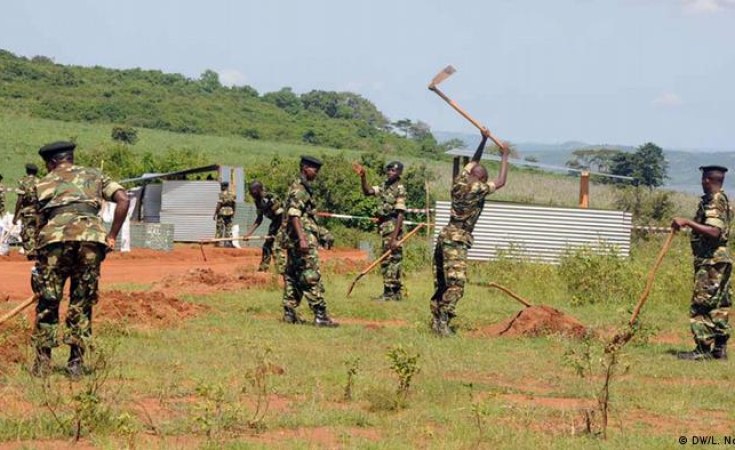President Yoweri Museveni together with his East African counterparts on Monday met and agreed to the proposed deployment of a regional standby force in Eastern Democratic Republic of Congo.
Kenya's president, also the chairman of the East African Community last week called for an urgent activation of an East African standby force to quell the violence in DRC and on Monday, he summoned a meeting of his fellow regional leaders.
ADVERTISEMENT
In the meeting, the regional army chiefs who had earlier met on Sunday briefed the heads of state of the proposed plan for deployment, prompting the leaders to give it a green light.
ADVERTISEMENT
"The deployed EAC regional force should, in cooperation with the military and administrative forces of the DRC, seek to stabilise and secure the peace in the DRC," a joint communique by the leaders released on Monday evening read in part.
During the third heads of state conclave on DRC, the East African leaders also agreed that the regional force will be constituted as an East African Community force under the EAC Protocol on Peace and Security and the EAC Treaty Article 124 on regional peace and security and Article 125 on cooperation in defence.
ADVERTISEMENT
"The regional force received its operational mandate and detailed its operational structure for the heads of state. In attendance at the brief was the Executive Secretary of the EAC."
Briefing
Before the meeting, the East African leaders were briefed in detail by the regional army chiefs about the plan for deployment of a regional standby force in DRC.
Presented by the Chief of Defence Forces of Kenya, General Robert Kibochi, in his capacity as the Chairman of the Committee of East African Community Chiefs of Defence Forces following a Sunday, June, 19 meeting in Nairobi, the brief defined the problem at hand and highlighted the concept of operations.
The brief from the regional army chiefs also highlighted the status of forces agreement, rules of engagement and other legal and technical regulations to facilitate the operationalization of the regional force and its various operational arms.
"The heads of state accepted and adopted the concept of operations, status of forces agreement and rules of engagement as presented by the Chiefs of Defence Forces for immediate implementation. In doing so, the heads of state instructed that the regional force should in cooperation with the military and administrative forces of the DRC seek to stabilize and secure the peace an in the DRC. The regional force should also cooperate in implementation of the disarmament and demobilization process," the joint communique said.
Ceasefire
The regional leaders directed that an immediate ceasefire should be enforced and cessation of hostilities should commence immediately, including withdrawal from recently taken positions.
" In doing so, the political process should be intensified by all parties in order to allow the citizens of the DRC feel safe and secure and be able to pick up and continue their respective social, cultural and economic activities."
"The conclave agreed and reinforced that trust and confidence-building, cessation of hostilities, unconditional ceasefire, participation in the political processes in the country, prioritization and participation in the country's development, citizenship, presence of foreign negative elements, fate of combatants during reintegration and status of refugees and internally displaced persons are among critical issues that require concerted, urgent and durable resolution."
The meeting didn't end without the leaders condemning and discouraging offensive language, hate speech, threats of genocide and other politically inciting language as has been used in eastern DRC following the outbreak of the violence since the attacks by M23 rebels.
Videos released on social media depicted men carrying machetes in what appeared to be acts leading to genocide and attacks against some groups of people.
The East African leaders however said this must stop, and urged all parties and people of DRC to work together to ensure peace in eastern DRC.
The meeting
The meeting which started at around 11am East African time was attended by Presidents Kenyatta as the host, Yoweri Museveni(Uganda), Paul Kagame(Rwanda),Salva Kiir Mayardit(South Sudan), Felix Tshisekedi(DRC) and Evariste Ndayishimiye(Burundi) whereas Tanzania was represented by the country's High Commissioner to Kenya, Amb. Dr.John Steven Simbachawene.
The summit saw Rwanda's Paul Kagame and DRC's Felix Tshisekedi meet for the first time since the Kinshasa establishment accused Kigali of supporting M23 rebels who have caused violence in eastern DRC, an accusation Kigali has dismissed as untrue.
Whereas there was no specific meeting between the two leaders, the summit in Nairobi was the first time they are in the same space.


